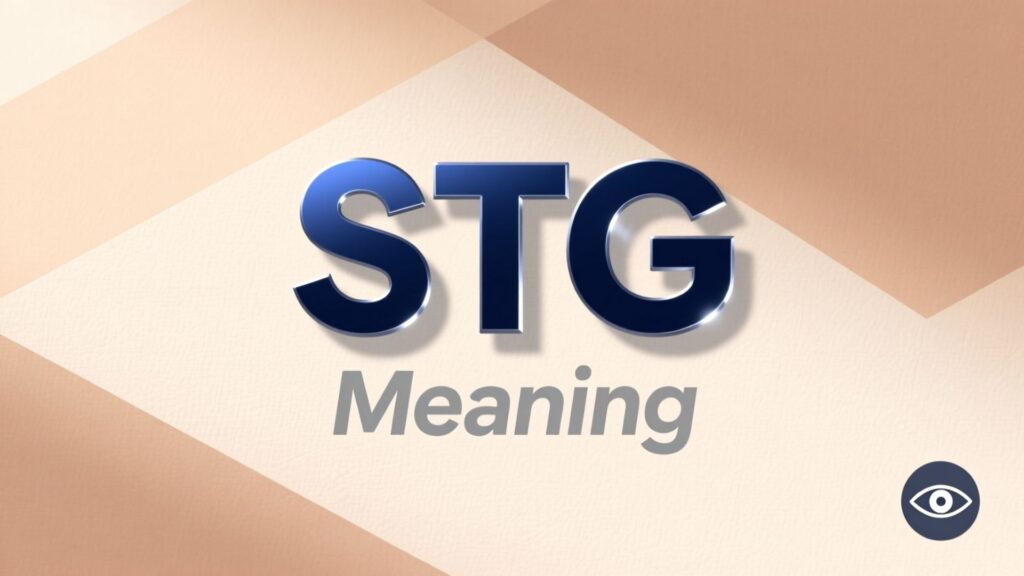STG Meaning in Text
You’ve probably seen someone type “STG” in a chat, caption, or comment and wondered, what does STG mean in text? Or maybe you typed it yourself and later worried whether you used it right. In this article, you’ll learn exactly what STG means, how people use it (and misuse it), and when to avoid it. You’ll also see good alternatives so your digital chats stay honest and smooth.
What Does “STG” Actually Mean?

STG in texting is shorthand for “Swear To God.”
When someone types “stg” (often lowercase), they’re giving their word emphasizing that what they’re saying is true, serious, or heartfelt. For example:
“STG I didn’t take your phone.”
“If you don’t believe me, stg I’m telling the truth.”
It’s the digital version of “I swear to God” when you want to convey sincerity or urgency without writing out the full phrase.
Other Meanings (Context Matters)
While “Swear To God” is the most common meaning in chats and texts, STG can also mean something else depending on context:
| Alternative Meaning | Domain / Use Case | Notes |
|---|---|---|
| Sterling (currency) | Finance, UK writing | An older abbreviation for pound sterling. |
| Shoot ’Em Up (video games) | Gaming context | Refers to a shooter game or genre. |
| Security Threat Group | Corrections / law enforcement | Refers to gangs or organized threat groups. |
Because of those alternate meanings, context is critical. But in most casual texting, “Swear To God” is what people mean when they use stg or STG.
The Tone Behind “STG”: Emphatic, Honest, or Over-the-Top?
Using “STG” signals more than just a meaning it carries emotional weight. It can stretch from gentle sincerity to full-blown drama, depending on how you use it.
- Sincere / earnest tone
“STG I’ll help you move this weekend.”
You’re making a promise and want to show you mean it. - Defensive / insisting tone
“STG I didn’t say that.”
You’re pushing against doubt or accusation. - Dramatic / playful tone
“STG I would die for pizza.”
Slight exaggeration, used for effect or humor.
Tone depends on context, relationship, and phrasing. Two people reading the same message might interpret it differently some hear sincerity, others sense sarcasm or overreaction.
“Don’t doubt me, stg.”
Is that a hurt tone, or just trying to prove something?
Because written text lacks vocal cues (tone, inflection), your choice of words around stg matters a lot. If your setup sounds too dramatic, the STG might feel extra intense even alarming.
When “STG” Feels Natural: Appropriate Use Cases
Using stg can feel smooth and natural in certain settings. Here’s when it works best:
- Among friends, peers, or informal groups
- In one-on-one chats where familiarity is established
- When you want to emphasize honesty or deep feeling
- When you want a shorthand intensifier without going full caps lock
Examples in context:
Friend: “You forgot my birthday again?”
You: “No, stg I did not.”
Group chat: “We gonna be late.”
You: “Stg traffic is killing us.”
Social media comment: “I love this song.”
“STG it gives me chills.”
In all these, stg fits smoothly. It’s familiar, punchy, and carries emotion without overexplaining.
When to Avoid Using “STG” (And Why)
“STG” isn’t for every situation using it in the wrong place can backfire. Below are the key pitfalls.
Formal or Professional Settings
Emails to your boss, school assignments, or business chats: STG feels out of place in formal or professional communication. It can seem immature, overly casual, or unprofessional.
Audience Unfamiliar with Slang
Some people older generations, colleagues, clients may not understand stg. They might misinterpret it or just see it as gibberish. If they’re unfamiliar, you risk confusion.
Sensitive, Religious, or Cultural Contexts
Because “Swear to God” uses religious language, some listeners might find STG offensive or disrespectful especially in religious or culturally sensitive environments.
Overuse or Dramatic Overload
Using stg in nearly every sentence dilutes its impact. It begins to feel melodramatic or insincere like you’re always on edge. Use it sparingly to keep its weight.
Real-world misread example:
“STG that didn’t happen.”
Could be read as accusing someone of lying even if you meant “I swear it didn’t happen.”
Whenever in doubt, omit it.
Modern Alternatives to “STG” – Better Choices in Many Settings

If stg doesn’t suit the tone or context, these alternatives help you express sincerity, emphasis, or honesty without risk. Organized by tone:
Polite / Professional Alternatives
| Phrase | Use Case | Example |
|---|---|---|
| I assure you | Formal or semi-formal promises | “I assure you, the report will be ready by tomorrow.” |
| You have my word | Strong promise in respectful tone | “You have my word, I won’t forget.” |
| On my honor | Weighty, solemn promise | “On my honor, I’ll never betray your trust.” |
Casual / Friendly Alternatives
| Phrase | Use Case | Example |
|---|---|---|
| For real | Everyday emphasis | “That joke was hilarious, for real.” |
| No lie | Slangy, colloquial | “No lie, that’s the best burger ever.” |
| Honestly | Neutral tone, less dramatic | “Honestly, I wasn’t expecting that.” |
| I mean it | Direct sincerity | “I mean it, you did a great job.” |
Expressive / Emotional Options
| Phrase | Tone | Example |
|---|---|---|
| Cross my heart | Gentle, sentimental | “Cross my heart, I’ll be there.” |
| Hand to heart | Emotional promise | “Hand to heart, I believe in you.” |
| Not even kidding | Slight exaggeration | “Not even kidding, I epic-failed that test.” |
| Seriously | Straightforward emphasis | “Seriously, that was the wildest day.” |
How to Choose the Right Alternative Based on Context
With so many options, how do you pick? Use the following simple decision guide:
1. Formal or professional tone needed?
→ Use “I assure you,” “You have my word,” or drop emphatics altogether.
2. Friendly but sincere chat?
→ Stick to “Honestly,” “I mean it,” or “For real.”
3. Emotional emphasis or confession?
→ “Cross my heart,” “Hand to heart,” or “Not even kidding.”
4. Young, casual audience?
→ “For real,” “No lie,” or “Seriously” will fit.
5. Avoid religious connotations for sensitive audience?
→ Skip anything referencing “swear” or “God,” even variant forms.
Why Clarity Matters More Than Slang
Slang like STG evolves fast. What’s trendy today might confuse people tomorrow. If your goal is clear communication, clarity should win.
- Avoid misinterpretation: Someone unfamiliar with stg might misunderstand or ignore it.
- Tone can misfire: The emotional weight of STG may not land the way you intend especially in text.
- Professional image matters: Using slang in formal or semi-formal spaces may harm your credibility.
Case Study: Brand Misuse of Slang
One brand posted on social media:
“STG this product will change your life.”
Some followers loved the authenticity. Others saw it as too casual or unprofessional. The brand later changed it to:
“We promise this product will transform your life.”
That swap maintained sincerity without risking slang confusion or tone missteps.
In short: use slang when it helps and ditch it when it hinders.
Common Mistakes People Make With “STG”
Even frequent users of stg slip up sometimes. Watch out for these pitfalls:
- Overusing it everywhere every message doesn’t need an emphatic.
- Using it in serious conversations it can feel dismissive or insincere.
- Texting it to new people or elders assume they may not know the slang.
- Sarcastic tones misread especially when no vocal cues exist.
- Clashing with religious or cultural values some audiences take “swear to God” literally and may object.
Learn from these mistakes: save STG for moments that truly deserve extra weight.
Quick Reference Table: “STG” at a Glance
| Category | Detail |
|---|---|
| Full Expansion | Swear to God |
| Usage Domain | Texting, social media, chat |
| Emotional Tone | Strong, emphatic, honest |
| Best With | Friends, peers, informal settings |
| Avoid In | Work emails, formal settings, religious contexts |
| Possible Misinterpretation | Could come off as defensive or sarcastic |
| Alternate Meanings | Sterling (currency), Shoot ’Em Up, Security Threat Group |
Final Thoughts: Use “STG” With Intention
“STG” is a powerful little shorthand. It lets you convey belief, emotion, truth, or urgency with just three letters. But like any tool, it works best when used intentionally and sparingly.
- Know your audience. If they might not understand or might misinterpret, skip it.
- Match tone to context. Casual chat? Go ahead. Formal conversation? Choose alternatives.
- Backup with surrounding phrasing. Let your words around STG support the intended meaning.
- Reserve it for moments that merit extra weight. Otherwise, it loses impact.
By using stg carefully or substituting it when needed you maintain both honesty and clarity in your digital voice.
Bugti is the founder of Quoethint.com, a hub for English language tips, writing advice, and grammar guidance. With years of experience in English studies and a passion for clear communication, Bugti created this platform to make grammar and writing easy to understand for everyone.
